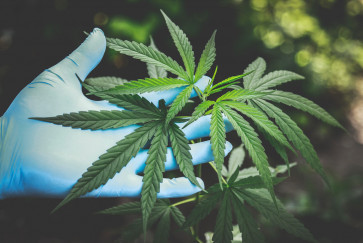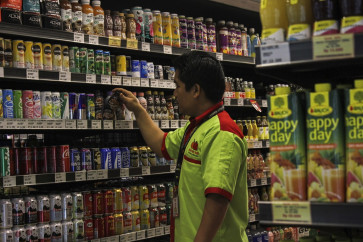`Jamu' sellers boast natural magic potion to cure ailments
Jamu anyone?: Bukti Mentjos, located on Jl
Change text size
Gift Premium Articles
to Anyone

Jamu anyone?: Bukti Mentjos, located on Jl. Salemba in Central Jakarta, is one of the city’s favorite spot to enjoy a traditional jamu drink. JP/Dina Indrasafitri
A young woman entered the Warung Bukti Mentjos jamu (traditional herbal medicine) bar in Salemba, Central Jakarta, on Monday afternoon.
After taking a seat at one of the stools facing a wide selection of jamu packets in a jar, she asked the waiter to make her a glass of jamu and banana kolak (sweet soup). While savoring the concoction, she discussed her health ailments with the waitress, who gave her a few tips and offered her more of the Mentjos specialties. The woman ended up spending almost Rp 100,000 on jamu powders and pills.
"On a busy day, we can serve up to 250 customers," Vera, a waitress in Mentjos, said.
Many Jakartans take jamu as a daily tonic to keep them going. With this in mind, hundreds of jamu stalls scattered across the city offer customers benefits ranging from sexual vitality to cures for colds.
Lately, however, a few blows have been dealt to these centuries-old herbal cures, such as the closing of three jamu factories in Central Java where jamu ingredients were mixed with chemicals, and the feared dumping of herbal medicines from China following the global economic crisis.
It is very easy to mix jamu with chemicals, Romuli, the owner of Mentjos, said.
"Some people mix packets of jamu with drugstore vitamins before giving them to customers, and some factories claim they use only natural ingredients when registering their products to the ministry of health, when in reality they use chemicals in the actual production process," he explained.
Romuli assured such practices were banned in Mentjos. The bar, which boasts almost 60 selections of its own jamu brand, uses natural ingredients mostly imported from Surakarta in Central Java, containing no chemicals.
Mentjos, with its antique Javanese d*cor and wooden paneling, is a far cry from the usual roadside jamu stall.
The jamu bar, which is around 60 years old, can seat up to 50 people, and displays its menu on light boxes, not unlike menu displayed in fast food restaurants.
One packet of Mentjos jamu powder costs around Rp 3,000 (40 US cents), but if the customer wants the jamu to be prepared in the bar, he or she must pay an extra Rp 10,000.
According to Romuli who inherited the business from his parents, his sales have not dropped since the global financial crisis struck last year.
"Our sales have been relatively stable," he said.
Neng, who owns a number of jamu bars in Rawajati, South Jakarta, was less optimistic. "Our sales have dropped significantly since October last year," she lamented.
The "Jamu caf*", a project started by housewives in the neighborhood, sells homemade jamu incorporating ingredients picked straight from a garden near the caf*.
"For some types of jamu, we pick leaves from the garden before slicing and boiling them with other previously prepared ingredients," Neng said.
She claims the concoctions have freed several locals from their ailments. Ida, a local, confirmed the success stories.
"Once, my neighbor suffered from diabetes, which gave him severe infections. After taking jamu from the caf*, he was cured," she said.
The natural scheme failed to work wonders for sales, though.
"When we started, we could sell around 30 glasses a day. Now we'd be lucky to sell two," Neng said.
The caf*, along with its garden and recycling schemes in the Rawajati, was once much-hyped and has received several environmental awards since its establishment around two years ago.
"I guess the attraction has worn off," Neng said. (dis)









